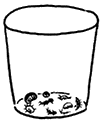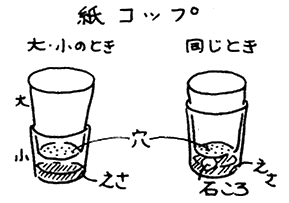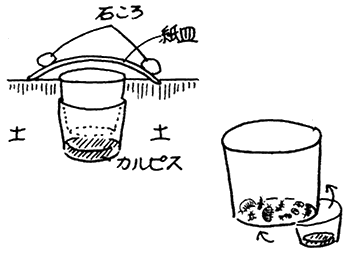
Internet Version [Naruhodo no Mori] Vol. 10
by Yumiko Mori

Vol. 10 September 15th, 1995
Finding strange insects
Home science experiments for mothers of elementary school children
Tae: shouting to Mom: "I will not help you this time.
Absolutely not!"
Mom:"OK, you don't have to do anything.
But can you just watch?"
Tae:"No! I hate bugs. They make me sick."
Mom:"All right.
You might have inherited dislike of bugs from myself.
I can tell you about my accident.
It happened during a field trip when I was in the middle school.
I was avoiding flying butterflies,
and then I jumped out in the front of a coming car and was hit lightly.
I felt so bad, since the driver and the teacher were very disturbed ."
Toshi, listening to our conversation:"Mom, that's dangerous!
But I don't like bugs either, since I was bitten by some kinds of catapillars."
Mom:"Oh, no! What a trouble!
We've just moved to this new house in the countryside.
There are a lot of bugs around here!"
Mother and her children area about to start an insect experiment.

Mom:"Shall we go to look whether or not bugs are already trapped?"
Mom is inviting children.
She does not want to go alone.
Tae insists not to come along.
Mom:"Oh, amazing! Lots of bugs crowling there."
Toshi:"I can recognize millipede."
Mom:"There are a lot of wood louse.
I believe they are usually hiding in soil.
But they can eat leaves or dead insects, so they are called sweepers."
Toshi: "That's an important job!"
Mom: "The book says we should observe them more carefully.
But I am afraid I don't want do it."
Toshi: "Me, either!"
Although our children did not enjoy,
other children who like insects should enjoy doing this experiment.
How to find strange bugs

Materials (for one trap)
- 2 paper cups
(Ideally one bigger cup and one small one,
but OK even if the two cups are of the same size.)
- Bait
(We got the best result with Calpis (a Japanese yoghurty drink).
We also tried beef and Japanese sake,
but we didn't collect many insects.)

- A needle
- A paper plate
(A large thick leaf can be used instead.)
Methods
You may want to place 2 or 3 traps simultaneously.
Required time: 1 week
- Make plenty of small holes at the bottom of one (smaller) cup with the needle.
- Put the bait into the smaller cup.
- Insert the other pierced cup into the bigger cup.
If you used two cups of the same size,
you should prevent the bottom of the upper cup
from touching the top surface of the food by placing stones in the food cup.

- Dig a hole in the earth enough for the cups to be almost submerged
(the top is ~3mm above the ground level.)
- Make sure that surrounding soil is not going into the cups.
Cover the cups with a paper plate to prevent them from getting wet.
- Need something to stop the paper plate from blowing away.
Use rocks or soils. Now your bait-trap is ready.
- Check once every day if any insects are trapped in the cup.
First ants should come in, then millipedes or wood louse should follow.
- What kinds of insects you collect probably depends on the cup location.
You may want place a few traps at different locations.
- Some insects are very small. Observe carefully.
- Let's release the trapped insects back to the wild.
Note
Last spring we moved to this suburban city, Zushi, from an urban city, Mitaka.
We have our own garden. There are mountains and beaches in the sorrounding area.
We thought this environment was ideal for our children to grow up.
But it is not necessary so, for my children don't like insects.
Everytime a big cicada accidentaly flys into our house, they go crazy, screaming (including myself).
I regret I didn't do something to stop them from hating insects.
I thought they would not scream like this, if they have had a chance to play with insects when they were younger.
But I don't know how much I could have helped, since I myself can not deal with insects.
I wonder today a increasing number of people are like us, because more people live in urban area.
I have lived in a big city since I was born.
I didn't realize there is another world.
In the cities I lived, I saw birds and insects in parks.
But I didn't feel anything special on those days.
Today I understand I can appreciate nature.
| Author | Yumiko Mori (Zushi, Kanagawa, Japan) |
|---|
| Illustration | Mitsue Ogata |
|---|
| Translator | Akira Ishihara |
|---|
| HTML format | Muneo Kume |
|---|
Copyright © 1995 Rika no Heya & Yumiko Mori










